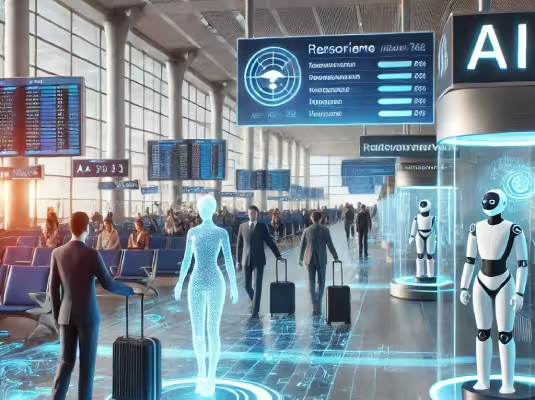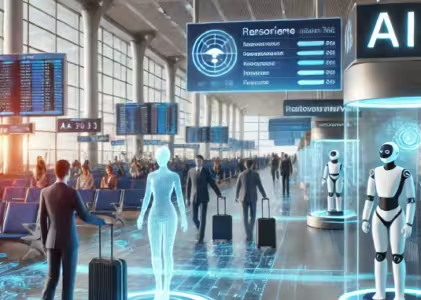Enhancing Passenger Experience with AI – So Picture this: You’re racing to a flight, and instead of tussling with endless lines and confusing terminals, your phone is guiding you step by step. It knows your preferences, sends notifications for the fastest lanes in security, and even suggests the perfect spot for a quick bite—all with you in mind.
Artificial intelligence—or AI—is about to take the passenger experience to new heights, making travel smoother, smarter, and—even surprisingly—much more personal.
What is AI doing behind the scenes of your journey?
Simplistically put, think of AI as an ultra-intelligent background assistant which ran through copious volumes of data and made predictions on what you will need and when. Allow me to elaborate.
Personalizing Travel Like Never Before
Have you ever wondered how Netflix or other streaming services sometimes seem to know what you want to watch next? AI in travel works largely in the same way. Airlines, rail services, and even ride-hailing apps use AI to make your experience personal with things like:
- Flight Suggestions: AI will be able to provide suggestions for flights based on previous travel habits—either flying early in the morning or abhorring layovers.
- Seat Selection: Want to sit by the window? AI remembers that and pre-selects it for you.
- Real-time Assistance: Miss your connection? AI can rebook your ticket in seconds and immediately let you know, saving yourself queuing.
Example:
Consider how Google Maps will often suggest alternative routes when traffic is bad. Similarly, AI in airports suggests the quickest route to get through security at the speediest or to gate changes without having to lift a finger.
Time-Saving and Stress-Reducing Route Optimization
Nobody likes delays, yet they’re somewhat inevitable. AI lessons the impact through real-time route optimization:
- Predicting Delays: Through the analysis of weather conditions, and airway traffic—even including scheduled maintenance—AI will notify passengers of probable delays before they happen.
- Dynamic Re-Routing: For ride-shares or buses, through AI’s recalculation of routes in real-time, passengers will reach faster despite unexpected detours.
A Relatable Analogy:
Think of AI as your GPS, plotting not just the course of your car but your entire travel, predicting problems and then solving them before you even notice.
Travel for All
The impact of AI does not stop at convenience but also extends into making travel inclusive:
- Language Barriers: Instant translations come courtesy of AI-powered apps, which make international trips less intimidating.
- Assistance for Disabilities: AI applications lead visually impaired passengers across airports through sensors and voice instructions.
These developments ensure that journeys indeed will be all-inclusive, irrespective of one’s background or capabilities.
What’s the Catch? Is There a Downside to AI in Travel?
Like any other technology, AI too has certain drawbacks:
- Data Privacy: For AI to tailor-make your experience, it requires access to information about you. The corporations promise they will keep it safe, but data breaches remain a valid concern.
- Over-Dependency: Passengers who get accustomed to taking orders from AI may become lost in the event of system malfunction or breakdowns.
Critical Thinking Moment:
Would you trade some personal info for a completely frictionless travel experience? For many, the answer isn’t quite simple, and that’s all right. These are the kinds of conversations that shape responsible AI in the future.
What’s Next in AI for Travel?
The journey for AI is only just beginning. Take a peek into what the future holds:
- Hyper-Personalization: Imagine this—your boarding pass combined with virtual reality to give you a 3D tour of your terminal before you even get there.
- Economical Travel: AI can help optimize fuel use and can suggest the most friendly eco-itinerary that reduces carbon emissions because of travel.
- AI Companions: The virtual assistant will soon be your Alexa/Siri buddy who will manage bookings, give you tips on sightseeing, and even calm your nerves down during turbulence.
More From Us
The Role of AI In Autonomous Vehicles
How AI is Changing Fleet Management
How AI is Changing the Transport Industry
Takeaway: A Bright Horizon for Travel
AI isn’t making travel more efficient; it’s delightful, accessible, and deeply personal. As technology evolves, the goal isn’t to replace human connection but to enhance it, so that passengers can spend their time and energy on what matters: the joy of exploring new places.


